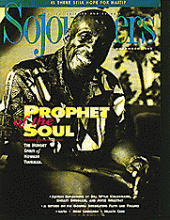You wouldn't know it by watching CNN, but some of the most important things happening in Somalia these days are taking place far from the mean streets of Mogadishu. There--in the countryside southwest of the capital or in devastated cities in the northwest--the seeds of a sustainable reconciliation and rebirth of Somalia have been planted.
Western organizations with years of involvement in Somalia--including the American Friends Service Committee (AFSC), Mennonite Central Committee (MCC), and others--continue to work with Somalis in efforts to restructure and rebuild the country. AFSC workers a few hours outside the capital report that their development program with rural Somalis has gone forward without interruption, virtually unaffected by the violence in Mogadishu. And while AFSC personnel will turn over the program to Somalis when that becomes appropriate, the U.S. development workers in the country are likely to be still hard at work when the last of the U.S. soldiers depart.
The media's narrow focus on the events in Mogadishu creates a "very colored picture" of Somalia, according to those with long experience in the region, and undermines broader efforts at reconciliation. The overemphasis on the capital puts "enormous attention on the limited number of subclans located there, and takes away from what's happening elsewhere," John Paul Lederach of MCC's International Conciliation program told Sojourners. "It empowers the wrong elements and disempowers the right elements."
Read the Full Article

